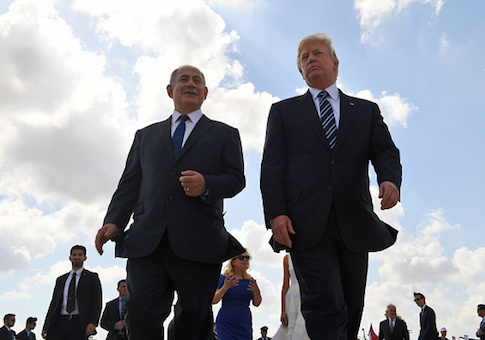Iran’s clerical leadership recently issued two new fatwas—or religious edicts—authorizing the assassination of President Donald Trump and Israeli prime minister Benjamin Netanyahu, deeming them enemies of Islam. Both decrees also make it substantially easier for Tehran’s internal security forces to abduct anti-regime dissidents galvanized by the United States and Israel’s recent strikes on the Islamic Republic.
Grand Ayatollah Nasser Makarem Shirazi, a hardline cleric close to Iranian supreme leader Ali Khamenei, issued the first fatwa on June 29. He falsely claimed that Trump has tried and will continue to try to kill Khamenei and declared the president “mohareb,” or “an enemy of Allah.” Any “Muslims of the world” who successfully assassinate Trump or Netanyahu, Shirazi proclaimed, will be deemed “warriors of Allah” and “receive blessings.”
“It is upon all Muslims across the world to make these enemies regret their words and their wrongdoing, and if harm or hardship befalls them, they will be rewarded as Mojaeh [warriors] in the path of Allah, if Allah wills it,” the fatwa states, according to an English-language translation performed by the National Union for Democracy in Iran (NUFDI), an anti-regime advocacy group.
Shirazi’s fatwa, NUFDI said in an analysis, “genuinely exists and clearly states a call to murder the President of the United States, unlike the nonexistent fatwa the Islamic Republic claims prohibits the development of nuclear weapons.”
A second fatwa, which Grand Ayatollah Hossein Nouri Hamedani issued a day later, contained similar rhetoric and made clear that any person who collaborates with the United States or Israel will face death.
The fact that Khamenei confidants signed both edicts rather than the supreme leader himself acts as cover for the regime’s leader, experts say. The two fatwas also set the stage for Tehran’s internal security services to engage in mass detentions, sweeping up dissidents who could challenge the regime in its current weakened state.
“Both religious decrees include revealing language that indicates that even the Ayatollahs penning these threats are well aware of the Islamic Republic’s inability to strike at its outside adversaries” like Trump and Netanyahu, according to Khosro Isfahani, a senior research analyst with NUFDI. “As is customary with the clerical establishment in Iran, frustrated with the state’s inabilities, the two clerics have instead laid the ground for security forces to lash out against innocent Iranians.”
The fatwas authorize severe penalties under Islamic law, including “death, crucifixion, cutting off their hands and feet on opposite sides, or exile from the land,” according to passages from the Quran NUFDI pointed out.
The Middle East Media Research Institute (MEMRI) described Hamedani’s fatwa—in which the cleric declares that “the might of Islam will deter America and Israel—as historic.
“Harm or insult to the authorities of Shi’ite religious law, and in particular to Ayatollah Khamenei, is considered to be haram to the foundations of Islam,” Hamedani wrote, according to a translation performed by MEMRI. “Any attempt to weaken him, especially at this time when the enemies of Islam, the Quran, and the Ahl Al-Bayt [Shi’ites] have united, is strictly forbidden.”
The edict essentially criminalizes any criticism directed at Khamenei and sends a clear warning to the Iranian people.
“The inward-looking declaration, the regime’s need to project power, and its heightened paranoia in the aftermath of recent security breaches have echoes of a 1988 Fatwa by then-Supreme Leader Ayatollah Khomeini,” explained Isfahani of NUFDI. “Issued during the Iran-Iraq war, the fatwa led to thousands of political prisoners being summarily executed and their bodies dumped in mass graves.”
Though both fatwas accuse Trump of trying to assassinate Khamenei, the president made clear in remarks last week that he spared the Iranian leader’s life.
“His country was decimated, his three evil nuclear sites were obliterated, and I knew exactly where he was sheltered, and would not let Israel, or the U.S. Armed Forces … terminate his life,” Trump wrote on Truth Social. “I saved him from a very ugly and ignominious death.”
The president also said that Tehran’s threatening rhetoric in the days since the ceasefire began led him to drop potential sanctions relief.
“I was working on the possible removal of sanctions, and other things, which would have given a much better chance to Iran at a full, fast, and complete recovery,” Trump wrote. “But no, instead I get hit with a statement of anger, hatred, and disgust, and immediately dropped all work on sanction relief.”

















